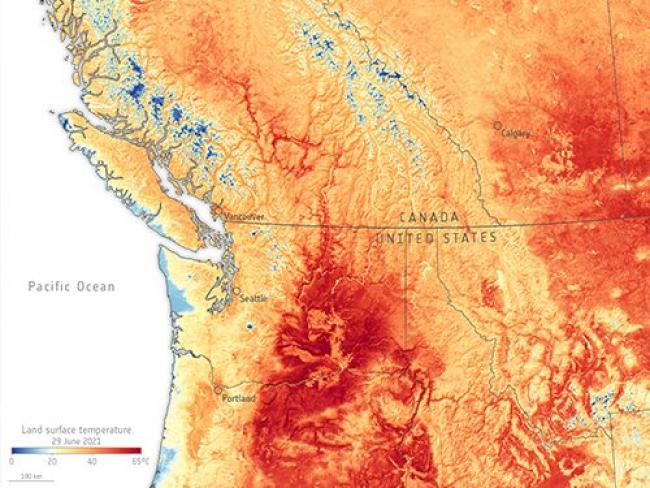Articles Menu

June 22, 2023
A county government in Oregon is suing more than a dozen fossil fuel companies for the costs it incurred in a 2021 heat emergency that killed at least 69 of its residents, in a move that could help prepare the ground for similar legal action in Canada.
In a civil suit filed this afternoon in Oregon Circuit Court, Multnomah County seeks to hold colossal fossils ExxonMobil, Shell, Chevron, BP, ConocoPhillips, and a dozen other defendants responsible for a killer heat dome that hit the county on June 25, 2021 and drove temperatures as high as 116°F/46.7°C, up to 40°F above the daily average for the region.
“The extreme heat caused the deaths of 69 people, property damage, and the significant expenditure of taxpayer monies and County resources,” the county says in a release.
“This lawsuit is about accountability and fairness, and I believe the people of Multnomah County deserve both. These businesses knew their products were unsafe and harmful, and they lied about it,” County Chair Jessica Vega Pederson said in the release.
“They have profited massively from their lies and left the rest of us to suffer the consequences and pay for the damages,” she added. “We say enough is enough.”
The lawsuit claims US$50 million in actual damages from the heat dome, $1.5 billion in future damages, and $50 billion to fund an abatement model to “study, plan, and upgrade the public health care services and infrastructure that will be reasonably necessary to ‘weatherproof’ the County from future extreme heat events and to safeguard the public health.”
The release cites a rapid attribution study that concluded the high temperatures would have been “virtually impossible” without climate change, which is in turn caused principally by burning fossil fuels. “Climate change, caused by greenhouse gas emissions, made the heat wave at least 150 times more likely to happen,” the World Weather Attribution Network said at the time.
“An event such as the Pacific Northwest 2021 heat wave is still rare or extremely rare in today’s climate, yet would be virtually impossible without human-caused climate change,” a 27-member research team declared in a published paper using published, peer-reviewed methods. “In the most realistic statistical analysis the event is estimated to be about a 1 in 1000 year event in today’s climate,” but “as warming continues, it will become a lot less rare.”
During the heat dome, climate pollution “caused dramatic rises in global temperature, drought, and the drying of regional soil,” the Multnomah County release states. “When those pollution-caused conditions combined with a dense high-pressure system that hovered over the Pacific Northwest, they converted the region’s typically mild climate into functionally that of a convection oven.”
On that basis, “the heat dome that cost so much life and loss was not a natural weather event,” the lawsuit states. “It did not just happen because life can be cruel, nor can it be rationalized as simply a mystery of God’s will. Rather, the heat dome was a direct and foreseeable consequence of the Defendants’ decision to sell as many fossil fuel products over the last six decades as they could and to lie to the County, the public, and the scientific community about the catastrophic harm that pollution from those products into the Earth’s and the County’s atmosphere would cause.”
In British Columbia, Andrew Gage, staff lawyer at West Coast Environmental Law, said a similar lawsuit in the province would typically have to be filed within two years of the damage it claimed. But there could be more than one way of calculating that timing.
“Is it when deaths actually occurred? Is it when the scientists studying the heat dome said this is actually caused by climate change? Certainly when the expense was incurred, that would make sense,” he said. And the costs of follow-up actions like local cooling centres would be newer still.
That means “it’s more complicated than just picking one date,” Gage told The Energy Mix Thursday morning. “You can’t say, ‘oh, climate change has stopped now’. We have to keep preparing as long as the atmosphere continues to heat.”
Over the last year, West Coast Environmental Law has been working with city governments across the province to organize legal action against fossil fuel companies for their share of the cost of local climate solutions. In March, the Township of Gibsons voted to contribute to a court case, contingent on other B.C. municipalities jumping onboard. Earlier this month, the Vancouver Island community of View Royal did the same, then wrote to other Capital Region District municipalities urging them to sign on.
Vancouver voted to join the campaign last July before a newly-elected city council reversed the decision.
“We’ve known for some time that this is a new ask for municipalities, and we need to build a critical mass of local governments that will take this step,” Gage told The Mix. But “this is a movement that has more and more communities stepping up and saying when there are enough municipalities, they’re in.”
He said today’s action by Multnomah County helps normalize a courtroom strategy where the obstacles are not about the legalities.
“The big barriers are social and psychological and political,” he said. “So the more municipalities around the world that say they’re going to hold this industry accountable, the easier it’s going to be to get other municipalities onboard—and when it goes to court, to have judges who’ve thought about these issues in advance and understand why” the case for damages is valid.
[Top image: European Space Agency/Flickr]